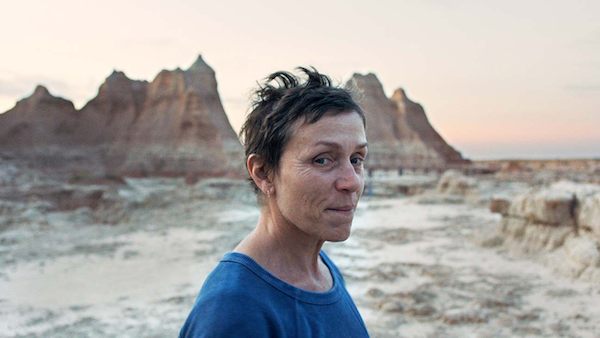Movie review by Greg Carlson
Even without the dark shadow of the pandemic, economic instability looms large in “Nomadland,” Chloe Zhao’s third feature. Already an award season favorite sure to pick up steam en route to multiple Oscar nominations, Zhao’s film affirms the moviemaker’s auteur bona fides ahead of her leap into the higher financial stakes and shareholder expectations of the Marvel Cinematic Universe. The cosmic scale and scope of “Eternals,” an effects-heavy comic book movie with a 200 million dollar budget, seems several solar systems away from the intimacies of “Songs My Brothers Taught Me” and “The Rider,” but once you see “Nomadland,” it is easy to understand why Kevin Feige and company would be eager to collaborate.
Two-time Academy Award winner Frances McDormand — who could very easily become a three-time Academy Award winner for her performance in “Nomadland” — is the key ingredient to Zhao’s mainstream arrival. McDormand, as always, fully commits to her character while retaining the essential traits we have come to identify with her screen persona. Fern has lost so much, including a spouse, a home, a job and even a zip code, that she elects to ditch most of her worldly possessions in favor of a customized van she uses to connect the dots to seasonal and short-term gigs, including a stint in an Amazon distribution and fulfillment center.
The road movie comes in all genres and styles, and Zhao’s appreciation for exteriors and landscapes stretching across multiple states results in a photo album of stunning images that we drink in along with Fern. There is an inherent thematic tension between the untethered freedoms of life on the move and the isolation and loneliness of long stretches behind the wheel, and Zhao and McDormand have a feel for how Fern’s circumstances should be explored.
Zhao communicates the nexus of that freedom/loneliness conflict and the feelings it inspires by taking us from the desert to the plains, the ocean to the Badlands. The latter location has drawn comparisons to the visual poetics of Terrence Malick, and Zhao’s affinity for the legendary artist is evident in the gorgeous cinematography of partner Joshua James Richards, who shot both of Zhao’s previous films.
One of the great pleasures of “Nomadland” is the consistently shrewd and perceptive manner in which Fern’s hidden depths and flinty pragmatics defy expectations. At one point, fairly early on, Zhao teases the viewer with an irresistible abandoned dog that in so many stories would surely become the protagonist’s companion. The duration of the wide shot while we wait on Fern’s decision is exquisitely agonizing. Zhao uses it to send a clear message to the viewer.
Zhao’s signature working method — the use of non-actors and the collection of massive amounts of footage that will be carefully shaped in post-production — is not entirely left behind with the addition of a big star. A significant number of the performers in “Nomadland” are indeed real-life travelers, and admirers of Zhao’s previous movies will recognize the filmmaker’s patience and curiosity in the artful way in which listening to the voices of others is something to be respected and honored.
